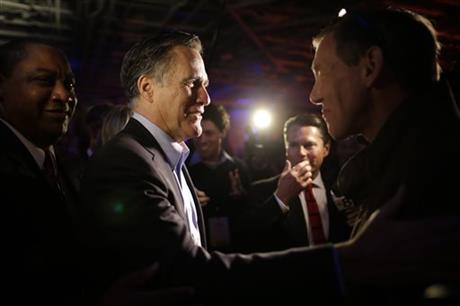
By STEVE PEOPLES and THOMAS BEAUMONT
Mitt Romney is offering a rare glimpse of his softer side as he marches toward an unlikely third presidential bid focused on poverty and the middle class.
Conceding that he’s giving “serious consideration to the future,” the Republican Party’s 2012 presidential nominee on Friday cited the support of his wife, Ann, as he addressed the closing reception of the Republican National Committee’s winter meeting aboard a retired aircraft carrier.
“The last few days, the most frequently asked question I get is, ‘What does Ann think about all this?'” Romney said as his wife looked on. “She believes that people get better with experience. And heaven knows I have experience running for president.”
He later added, “She knows where my heart is.”
Romney earned a standing ovation for his remarks, his first public acknowledgement of 2016 ambitions since privately signaling interest with donors a week earlier. However, RNC members and his prospective opponents were far less welcoming in the days leading up to his appearance.
“The country moves on,” said Henry Barbour, a Republican national committeeman from Mississippi. “And that’s going to be a challenge for Gov. Romney.”
History is not on Romney’s side. Not since Richard Nixon has a Republican presidential nominee lost the general election — John F. Kennedy defeated Nixon in 1960 — and then won the GOP nomination again. Nixon defeated Hubert Humphrey in 1968.
Yet there is little doubt Romney would be a force in the 2016 contest should he run.
He remains one of the best-known Republicans in the nation, maintains close ties to the GOP elite donor class and has a network of loyal supporters across the country. Early polls show him doing well against lesser-known potential Republican opponents.
Yet an overwhelming concern from former supporters looms over his return to the national stage: the lingering perception that the former private equity executive cares only about the fate of wealthy Americans.
The image was fueled in part by his own high-profile missteps during his last presidential campaign. The son of an auto company chief executive who made a fortune in finance measured in the hundreds of millions famously described corporations as people and highlighted his close friendships with the owners of professional sports teams.
No gaffe was bigger than Romney’s remark — secretly recorded at a high-dollar Florida fundraiser — that he doesn’t worry about 47 percent of Americans who “believe they are victims” and “pay no income tax.”
On Friday, however, he hinted that he had learned his lesson.
Romney outlined three principles that could serve as the foundation of a campaign during a 15-minute speech, while referencing his work with the poor, sick and elderly as a volunteer church pastor — a topic he rarely addressed during his previous bids.
His new focus includes national security, improving opportunities for the middle class and “breaking the scourge of poverty.”
“Our principles will bring opportunity to every American,” Romney declared, adding, “It’s a tragedy, a human tragedy, that the middle class in this country by and large doesn’t believe that the future will be better than the past.”
The growing field of first-time Republican presidential prospects was largely dismissive of Romney, while others questioned his ability to broaden his appeal in a third campaign.
“He just didn’t attract a big enough constituency,” Kentucky Sen. Rand Paul said as he courted voters earlier in the day in Las Vegas.
Indeed, Romney struggled to win over younger voters, lower income voters and minorities on the way to a 2012 campaign loss that devastated his family and his party. Friends and foes alike concede he’ll have to do more than change his message to win new supporters.
Paul on Friday repeated that he had been reaching out to ethnic and racial minorities for more than a year to broaden the GOP’s appeal, where Romney had only recently admitted to past supporters that he needed to do better connecting with Hispanics and addressing the needs of the poor.
Paul cast himself as “someone who can reach out to the African-American community and the Hispanic community and the youth community and the working class and say, “You know what? We understand.'”
As Paul has taken steps toward running for president he has held public events in inner-city communities, including schools on Chicago’s south side.
Texas Gov. Rick Perry, meanwhile, declared himself ready for another presidential run and said Romney’s interest in a 2016 bid “doesn’t change my dynamic.”
“It doesn’t change my strategy,” Perry said in an interview before Romney’s speech.
Romney’s team suggests he will make a decision about the 2016 campaign soon, both out of fairness to the other candidates contemplating bids and former allies who had begun to move on. Former Gov. Florida Jeb Bush began phoning leading officials in New Hampshire this week, with similar calls planned for Iowa — the first and second states on the presidential nominating calendar.
“While I have a lot of respect for Gov. Romney, and you know I think he is imminently qualified to serve as president, I think there’s going to have to be a vetting process in New Hampshire again,” said Sen. Kelly Ayotte, R-N.H., a major Romney supporter in 2012 who was among those on Bush’s recent call list.
“I want to know what’s his vision for the country, just like I’m going to want to know from every candidate, so I think this field is wide open still,” she said.
___
Associated Press writers Ken Ritter in Las Vegas and Kathleen Ronayne in Concord, New Hampshire, contributed to this report.



